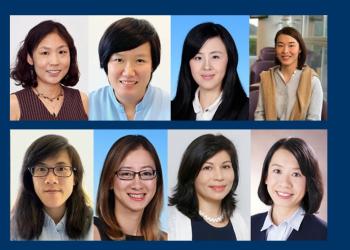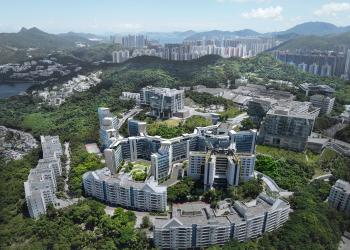News & Stories
2024
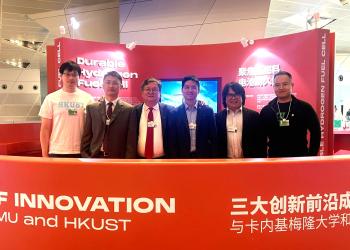
Stories
HKUST Cohort Inspires Awe with Game-changing Innovations at WEF Summer Davos 2024
AI technologies are poised to become more humanized in the art scene, according to Professor GUO Yike, HKUST Provost and world-renowned scholar on Artificial Intelligence (AI) and machine learning, who shared his thought leadership on the interplay of Generative AI and art at the World Economic Forum (WEF) Summer Davos 2024. Joining Professor Guo at the global event were Professor SHAO Minhua, Head and Chair Professor, Department of Chemical and Biological Engineering, and Professor FAN Zhiyong, Chair Professor, Department of Electronic and Computer Engineering — both of whom showcased innovations at this prestigious event— while Professor HUI Pan, Chair Professor of Computational Media and Arts of HKUST (GZ), participated as a member of Global Future Council on the Future of Metaverse.
2023
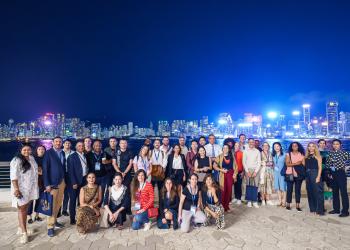
News
HKUST’s First Leadership Development Program with the World Economic Forum in Greater China Concludes (Chinese version only)
香港科技大學(科大)與世界經濟論壇合作,於上周接待了40位來自包括歐洲、北美洲、拉丁美洲、非洲和中東等22個國家及地區,專業領域涵蓋法律、科技、媒體、公共行政、投資銀行和人道援助等領域的年輕管理人員和公司創辦人,成為大中華區首間舉辦「全球青年領袖論壇領導力發展課程」的大學。科大校董會主席沈向洋教授、校長葉玉如教授、首席副校長郭毅可教授、副校長(大學拓展)汪揚教授以及科大其他教授,均就其各自專業於課程活動中分享及講授與人工智能(AI)相關的話題。
葉玉如教授在歡迎午宴中表示科大在人工智能的開發和應用均走在前沿。大學致力參與尖端人工智能研究,並開發先驅性技術。是次課程除邀得科大頂級學者,就AI最新發展及該技術對環球經濟和社會的影響授課,亦邀請了香港大學和香港教育大學的世界級學者講授課程。大學亦響應「香港夜繽紛」,安排學員參觀尖沙咀海濱等景點,體驗香港國際大都會氣氛,又帶同學員走訪香港與內地的初創企業和科技巨頭,促進來自世界各地的課程參與者與大灣區創業者、研究員與投資者之間的交流。參與是次課程的青年領袖來自不同背景,包括巴西政黨、貝克麥堅時律師事務所、美國有線新聞網絡和里約熱內盧州檢察官辦公室等。
多國大學如哈佛、普林斯頓、劍橋和牛津等,均曾與世界經濟論壇合作舉辦「全球青年領袖論壇領導力發展課程」,探討包括能源創新和可持續發展等全球重要議題。
2022

News
Art Through a Woman's Eyes
In the finale of the Smashing the Glass Ceiling series, Hong Kong-based artist Vivian Ho (HKUST MBA Alumna 2018) reflects on her journey in the art world and how she navigates the local art scene as a woman.
I was judged by the boss of a well-known gallery saying he wouldn't invest in a young female artist.
One of Vivian Ho’s earliest encounters with the art world back in Hong Kong in 2012 after returning from studying art at Wesleyan University in the United States was less than positive.
“I approached a well-known gallery and the boss was like: ‘Why should I invest in a young female artist when she’s just going to get married in the future and stop being an artist?’ I had just come from this transgender-friendly campus, and was now hearing a man judging me based on whether I was going to get married off.”
2021
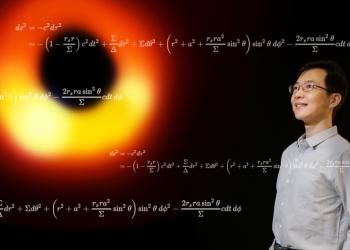
Stories
Expert Series: Into the Darkest Mystery
Sixty years ago, the whole world was gladly amazed when the first human blasted into space; over the years, hundreds of exploration missions have been deployed to extend our knowledge and understanding of the universe. Of all the space mysteries scientists still hope to solve, black holes remain the strangest and most mysterious phenomena we know so little about. After decades of effort, scientists finally reached a major milestone when they came face to face with a black hole by capturing its first-ever image in 2019, and a more detailed one earlier this year. The ground-breaking images show the supermassive black hole at the center of Messier 87, a galaxy about 54 million light-years away from Earth. The black hole's mass is equivalent to 6.5 billion suns.

News
Expert Series: Should We Harness AI Or Fear It?
Ever since computer science pioneer, Alan Turing, first asked “can machines think?” back in the 1940s, humanity’s concerns about machines capable of acquiring the knowledge it needed to evolve have never faded. With potential applications for Artificial Intelligence (AI) now growing at a near exponential rate, how are we humans coping with the technology’s uncertainties? A renowned expert in the field of ethical use of AI, Prof. Pascale FUNG here sheds some light on the technology’s many benefits and risks. Her biggest concern is people’s ignorance about AI means we may be doing a disservice to both ourselves and AI.
AI creates rather than eliminates jobs







